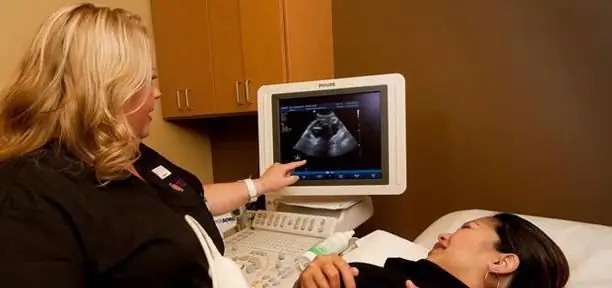2026 Author: Priscilla Miln | miln@babymagazinclub.com. Last modified: 2025-01-22 17:55:21
The first comprehensive examination of the baby is carried out long before his birth. So, for a period of 11 to 14 weeks, obstetricians-gynecologists recommend that almost all of their patients screen for the first trimester. Do not be afraid of this phrase, they will not do anything terrible with the expectant mother and child. This study includes the usual ultrasound diagnostics and a special blood test from a vein, which is taken from the mother in the laboratory. This is why first trimester screening is also called a double test.

The specified period is the most favorable for identifying possible genetic failures in the baby. Based on the results of the analysis and ultrasound, a specialist can identify various malformations of organs or body systems and predict whether it is likely that the child has Down syndrome, Klinefelter or Edwards. First trimester screening shows only the likelihood of genetic diseases, and in the course of further research, they can either be confirmed or disproved.

The principle of this study is based onthat during an ultrasound, the doctor not only looks to see if the baby’s legs and arms are in place, but also takes certain measurements. The length of the baby is measured, its compliance with the age of the fetus is checked. A rather important indicator is the thickness of the neck fold - the collar zone. This is the area between the soft tissues and the skin in which fluid accumulates. An excessive increase in its size indicates a high risk of developing genetic diseases. The nasal bone is also measured: by the end of the 3rd month of pregnancy, it should already be about 3 mm.
You will definitely be told if the specialist does not like the results of the first trimester screening. The thickness norms for the collar zone, for example, vary depending on the duration of pregnancy: at 11 weeks, its average thickness is 1.2 mm, and at 14 - 1.5 mm. But there is no reason to panic if this zone is 2-2.5 mm. Even if the values are increased, don't panic. Taking into account the fact that the accuracy of measurements depends on the equipment and the level of professionalism of the doctor of ultrasound diagnostics, it makes no sense to evaluate the results of this study without analyzes.

In the laboratory, the screening of the first trimester is a biochemical analysis, during which the content of free b-hCG and plasma protein A (PAPP-A) in the blood of the expectant mother is examined and compared with the average values that should be. The laboratory on the form indicates the results obtained and their norms for each week. Only a combination of tests and ultrasound results can give a relatively clear picture of how thepregnancy. Screening of the first trimester cannot be considered reliable if you only donate blood or just do an ultrasound. Moreover, these studies should be done almost on the same day to exclude the possibility of error due to time discrepancies.
Don't give up research just because you're afraid of getting bad results. Even if this happens, no one can force you to terminate the pregnancy, you will simply be advised to go for further research in order to accurately confirm or refute the diagnosis. But if you know in advance about possible problems, you can prepare accordingly for the birth of a special baby.
Recommended:
What you need for a newborn for the first time: a list of things

In today's world there is a wide choice of things for newborns, in every city you can find more than one store specializing in goods for babies. With so many to choose from and fast-paced fashion trends and technology, many young parents get lost in the variety of products on offer
Trimester 2: Pregnancy screening. Deciphering the results, which shows the timing of the

Doctors recommend every pregnant woman to donate blood and undergo ultrasound at certain periods. The doctor compares the results obtained with the norms of 2 screenings during pregnancy. After that, the patient can be prescribed treatment. When to take this test. Deciphering indicators 2 screening during pregnancy
Why do you need a wife? How to become a smart wife? Does a modern man need a wife

In today's world, family values are greatly distorted. The reason is simple: women and men have gained equal rights, and instead of building a simple nest, we give ourselves completely to a career and an illusory perspective. But let's find out why a wife is needed and whether it is important to register a marriage in the 21st century
Norm for screening ultrasound of the 1st trimester. Screening of the 1st trimester: terms, norms for ultrasound, ultrasound interpretation

Why is 1st trimester perinatal screening done? What indicators can be checked by ultrasound in the period of 10-14 weeks?
Where to do the screening of the 1st trimester in St. Petersburg during pregnancy?

Where to do the screening of the 1st trimester in St. Petersburg? This question worries all expectant mothers from the day they determine their interesting position. Consider all options

